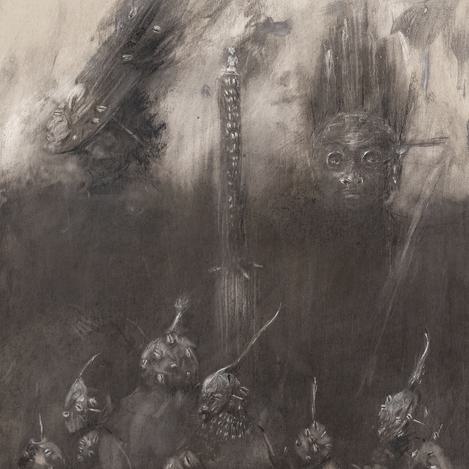The Great Bailout is a dense and visceral history lesson from Moor Mother
"The Great Bailout"

Camae Ayewa, having explored the origins of Black music on 2022’s Jazz Codes, is now interested in the horrors of colonialism.
Enslavement: a word that contains centuries-long history and stirs strong sentiments. First used in the mid-seventeenth century – though the act had begun long before – it has since formed a direct association with ships carrying captive cargoes up for later human trade. Ayewa, a prolific poet-musician whose work always studies the hidden truths about the Black community, opens The Great Bailout with this foundational insight. The song trudges into a whispered refrain afterwards, pivoting back to the present, targeting a certain race: “Did you pay off the trauma?”
Her records, either as soloist Moor Mother or jazz collective Irreversible Entanglements, are full of racial politics. The latter’s latest project Protect Your Lights, for example, examines those related to slavery. The Great Bailout is of the same category, but where she used to experiment with the instruments that make up the genres Black people originated, she does so now with the powerful voices of her Black collaborators. Their expressionist, free-form singing feels like an act of communal empowerment, a defensive tactic against the atrocities of the album’s dreary, haunting topics.
Most of the tracks on The Great Bailout are livid manifestos of justice for a race much marred by the leading empires’ colonisation. Ayewa speaks with bone-chilling solemnity on foolish, now-repealed laws and the afflictions of enslavement, backed by a meticulous layering of murmurs, yowls, and eccentric vocal percussion. In “All the Money”, she mentions Virginia’s appeal of an act in 1669 that allowed masters to punish their slaves to death. Alya Al Sultani, the only feature there, helps support her claims by crying in the back, adding an aptly harrowing touch to the song.
It’s a wonderfully strange, dense, and visceral album that finds solace in uncanny experimentalism. Pieces like “Death by Longitude” and “Liverpool Wins” are among Ayewa’s most thrilling work: devoid of mundane structure and traditional singing, imbued with maniacal sounds and spoken-word poetry. She spits at the Slavery Abolition Act of 1883 in the former track, which, while freeing the slaves, gave financial compensation to their owners. Her fury is thus lit aflame, and the song’s terrifying descent to madness becomes one of the record’s greatest climaxes.
Knowing that only a fraction of Black history is brought to public consciousness, Ayewa intends to popularise the lesser-known facts with The Great Bailout. Perhaps she deems the acknowledgement of all these things necessary for a better future, a sound practice of philosopher Santayana’s famous quote. In this respect every song here succeeds, even if sometimes they’re undeveloped. (“Guilty” gets the stark message across, but the lengthy buildup can use a little trimming.) She’s created an enticing starting point in history that longs to be discovered; at this point, how can we resist?
Get the Best Fit take on the week in music direct to your inbox every Friday

Tunde Adebimpe
Thee Black Boltz

Julien Baker & TORRES
Send A Prayer My Way

Bon Iver
SABLE, fABLE





